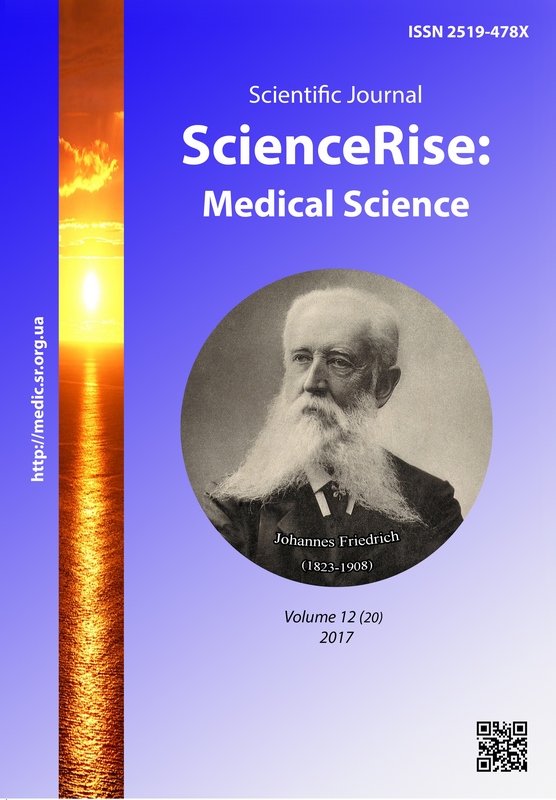Substantiation and fundamentals of medico-psychological escort in the child neurosurgery sphere
DOI:
https://doi.org/10.15587/2519-4798.2017.118849Keywords:
infant's parents, craniocerebral trauma, emotional disorders, anxiety, depression, astheniaAbstract
Aim: Comprehensive study of the features of emotional disorders in the parents of a child of the first year of life with severe craniocerebral trauma.
Materials and methods. To achieve this aim, in compliance with the principles of bioethics and medical deontology was conducted a comprehensive clinical-anamnestic, clinical-psychological and psychodiagnostic examination of 137 families (mother and father) of children of the first year of life who received a craniocerebral trauma. All the examined families were full (mother and father), the average age of their parents was 27.0 ± 3.0 years.
The main group consisted of 97 families who took part in the program of medical and psychological support using psycho education. Control group - 40 families who did not receive psychological support.
The following survey methods were used in the study: clinical and anamnestic; clinical and psychological; psychodiagnostic using a questionnaire of nervous-psychic stress, clinical scale of anxiety and depression of Hamilton, adapted to MKH-10; scale of situational and personal anxiety Ch.D. Spielberger, methods of studying the styles of stress-breaking behavior "Methods of coping", methodology "Determination of ways to resolve conflicts" by K. Thomas in adaptation by N.V. Grishina.
Results of the research. The child's illness is a traumatic situation for all parents, which leads to the development of anxiety-depressive reactions and conditions. Distributed anxiety-depressive, astheno-depressive, depressive-apatitic and dysphoric variants of emotional disorders in the parents of infants with severe craniocerebral trauma and described their clinical features.
For parents of infants with severe craniocerebral trauma are characterized as ones with high levels of emotional stress, a sharp increase of negative emotions, a feeling of anxiety, depressive manifestations.
The obtained results allowed to substantiate expediency of medical-psychological support of the family with the first year child with severe craniocerebral trauma, which includes methods of differentiated psychotherapy and psycho-educational programs.
Conclusions The structure of psycho-emotional disorders in the parents of infants with severe craniocerebral trauma is represented by anxiety-depressive (40.9%), asthenoid-depressive (22.5%), depression-apathy (20.5%) and dysphoric (16.1%) variants.
The efficiency of the system of medical and psychological support of the family with the first year child with severe craniocerebral trauma, which includes methods of differentiated psychotherapy and psycho-educational programs is proved
References
- Zavgorodnya, N. I. (2014). Mechanism of formation and clinical features of adaptation disorders in women who gave birth to a premature infant. Experimental and Clinical Medicine, 1 (62), 131–136.
- Shlapak, I. P., Burchynskyi, V. H., Pylypenko, M. M. (2005). Epidemiolohichne doslidzhennia smertnosti vid ChMT v Ukraini. Ukrainskyi neirokhirurhichnyi zhurnal, 3, 14–16.
- Kvasnіtskiy, M. V. (2013). Dіagnostika ta nadannya pershoi medichnoi dopomogi pri cherepno-mozkovіy travmі. Meditsina neotlozhnykh sostoyaniy, 3 (50), 34–38.
- Valiullina, S. A., Promyslova, S. A., Tyutyukina, A. I. et. al. (2014). Children craniocerebral trauma: epidemiology and basic principles of the organization of medical care. Moscow, 24.
- Back, A. L., Arnold, R. M., Baile, W. F. (2007). Efficacy of communication skills training for giving bad news and discussing transitions to palliative care. Archives of Internal Medicine, 167 (5), 453–460. doi: 10.1001/archinte.167.5.453
- Salehpoor, F., Bazzazi, A. M., Estakhri, R., Zaheri, M., Asghari, B. (2010). Correlation between Catecholamine Levels and Outcome in Patients with Severe Head Trauma. Pakistan Journal of Biological Sciences, 13 (15), 738–742. doi: 10.3923/pjbs.2010.738.742
- Polinder, S., Haagsma, J. A., van Klaveren, D., Steyerberg, E. W., van Beeck, E. F. (2015). Health-related quality of life after TBI: a systematic review of study design, instruments, measurement properties, and outcome. Population Health Metrics, 13 (1). doi: 10.1186/s12963-015-0037-1
- Wang, H.-C., Yang, T.-M., Lin, Y.-J., Chen, W.-F., Ho, J.-T., Lin, Y.-T. et. al. (2014). Serial Serum Leukocyte Apoptosis Levels as Predictors of Outcome in Acute Traumatic Brain Injury. BioMed Research International, 2014, 1–11. doi: 10.1155/2014/720870
- Shestopalova, L. F., Kukuruza, H. V. (2011). Typy zakhysno-kopinhovoi povedinky batkiv, yaki vykhovuiut ditei rannoho viku iz porushenniamy psykhomotornoho rozvytku. Medytsynskaia psykholohyia, 1, 14–17.
- Vetrila, T. G. (2009). Mediko-psikhologicheskie problemy funktsionirovaniya sem'i, vospityvayushhey rebenka s narusheniem psikhicheskogo razvitiya. Meditsinskaya psikhologiya, 4 (1 (13)), 48–51.
- Kuzhel, I. R. (2010). Assessment of the level of stress and severity of psychopathological symptoms among members of the family of incurable oncological patients. Medical Psychology, 5 (4), 50–59.
- Piontkovskaya, O. V. (2013). The state of mental health of parents of children with oncological pathology. Ukrainian Bulletin of Psychoneurology, 21 (1 (74)), 90–94.
- Piontkovskaya, O. V., Markova, M. V., Piskunova, N. V. (2013). Vnutrilichnostnye i povedencheskie patterny roditeley detey s onkologicheskoy patologiey v kontekste sostoyaniya ikh semeynogo vzaimodeystviya. Psikhiatriya, psikhoterapiya i klinicheskaya psikhologiya, 3 (13), 45–53.
- Kasianova, A. Yu., Markova, M. V. (2015). Kontseptsiia medyko-psykholohichnoi dopomohy v klinitsi dytiachoi kardiokhirurhii. Ukrainskyi visnyk psykhonevrolohii, 23 (1 (82)), 87–89.
Downloads
Published
How to Cite
Issue
Section
License
Copyright (c) 2017 Oleksandr Dukhovskyy

This work is licensed under a Creative Commons Attribution 4.0 International License.
Our journal abides by the Creative Commons CC BY copyright rights and permissions for open access journals.
Authors, who are published in this journal, agree to the following conditions:
1. The authors reserve the right to authorship of the work and pass the first publication right of this work to the journal under the terms of a Creative Commons CC BY, which allows others to freely distribute the published research with the obligatory reference to the authors of the original work and the first publication of the work in this journal.
2. The authors have the right to conclude separate supplement agreements that relate to non-exclusive work distribution in the form in which it has been published by the journal (for example, to upload the work to the online storage of the journal or publish it as part of a monograph), provided that the reference to the first publication of the work in this journal is included.









